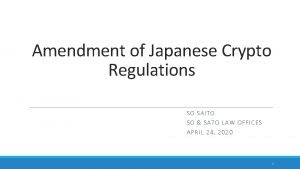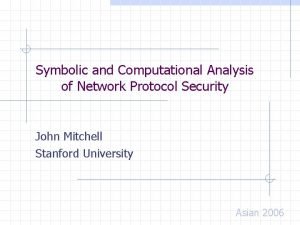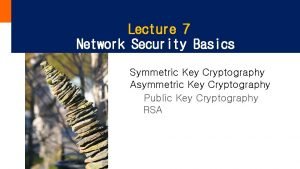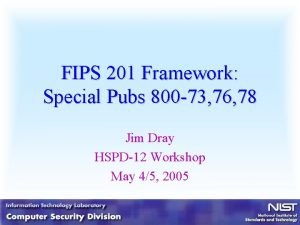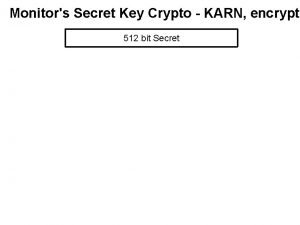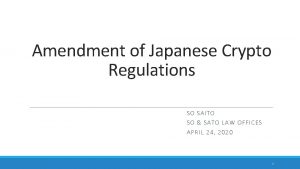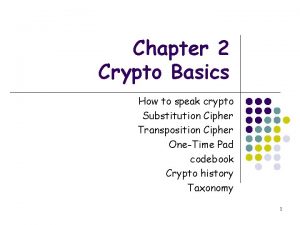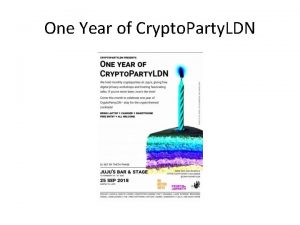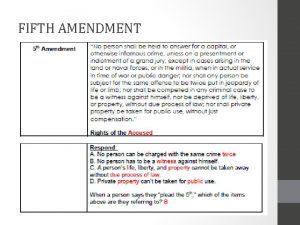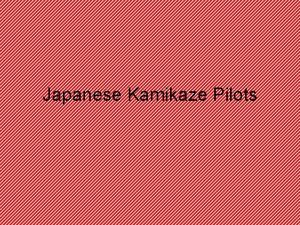Amendment of Japanese Crypto Regulations SO SAITO SO







![[I will insert figures] 8 [I will insert figures] 8](https://slidetodoc.com/presentation_image/1f0fab03627cb62ddff597c72a261e3b/image-8.jpg)










- Slides: 18

Amendment of Japanese Crypto Regulations SO SAITO SO & SATO LAW OFFICES APRIL 24, 2020 1

Speaker’s biography • Admitted to the bar in Japan (1999 -) and in the State of New York (2005) • Founder of So & Sato Law Offices (2015 -) • Legal adviser of the Japan Blockchain Association (JBA) (2014 -) • Auditor of the Japan STO Association (2019 -) • Specializing in crypto-related laws since 2013 2

Overview Amendments to the following acts will enter into force on May 1, 2020 • Payment Services Act (“PSA”) which deals with crypto assets • Financial Instruments and Exchange Act ("FIEA ") which deals with derivatives and security tokens 3

Timeline April 2017 existing crypto regulations enter into force 2017 crypto prices rise and many fraudulent ICOs are launched January 2018 hack of Coincheck followed by on-site inspections of registered exchanges by the FSA May 31, 2019 Diets pass amendments to existing crypto regulation May 1, 2020 revised acts enter into force 4

Key amendments • Stricter regulations for crypto asset exchanges, especially regarding wallet regulation. • The PSA will apply custody business. • New crypto derivatives regulations (2 x leverage ratio). • New STO regulations. 5

New Terminology The term "Virtual Currency" in the PSA will be changed to “Crypto Asset”. 6

New Cold Wallet Regulation Exchanges must store at least 95% of their users’ crypto assets in a cold wallet. Up to 5% of the users’ crypto assets may be held in hot wallet. For users’ crypto assets stored in a hot wallet, an exchange must keep the same amount of its own assets in a cold wallet (performance guaranteed crypto asset) = 100% of users’ crypto assets stored in a cold wallet Impact Increased security, higher costs. 7
![I will insert figures 8 [I will insert figures] 8](https://slidetodoc.com/presentation_image/1f0fab03627cb62ddff597c72a261e3b/image-8.jpg)
[I will insert figures] 8

New Custody Business Regulation (1) The current crypto laws regulate persons who conduct the following business • purchase/sale of crypto assets (exchange between fiat and crypto assets) • exchange of crypto assets with other crypto assets The amended PSA now regulates the “custody of crypto assets on behalf of others” (excluding regulated trust businesses). Custody business operators must take the same license as exchanges. 9

New Custody Business Regulation (2) Impact Custody service is mainly provided by already registered exchanges. The impact is therefore limited. Custody of one of multi-signature is not considered as custody service. Some small wallet service providers intend to change their business model, others announced to withdraw from the business. 10

New Crypto Derivatives Regulations (1) Under the revised FIEA crypto assets are now included in the definition of “financial instruments”. Crypto derivatives are therefore regulated under the new FIEA. Only Type I FIBO can deal with crypto derivatives. Leverage ratio Currently 4 X times under self-regulations → 2 X in general. 11

New Crypto Derivatives Regulations (2) Impact Trading in Japan will be safer. More corporate investors may join because of clarification of regulations Trading volume of individuals will be less / Some exchanges will stop operations or merge. Some investors will use foreign exchanges (100 X leverage ratio). (illegal) No tax reform yet 12

Security Token Offerings (1) The revised FIEA defines “electronic record transfer rights” (ERTR). ERTR are type II securities (e. g. units in a fund) which are tokenized. ERTR are subject to regulations similar to type I securities 13

Security Token Offerings (2) Type I Securities Type II Securities characteristic features highly liquid securities (e. g. stocks, corporate bonds, units in investment trusts) illiquid rights (e. g. funds, partnerships in a limited liability company, beneficiary interests in an ordinary trust) license requirements handled by a Type I FIBO (e. g. securities company) handled by Type II FIBO (e. g. fund companies) disclosure requirements yes no, in general 14

Security Token Offerings (3) The treatment of ERTR is similar to the treatment of type I securities. • Type I FIBO must handle ERTR • disclosure requirements apply It is possible to tokenize type I securities (e. g. shares, bonds, units in investment trusts). In general, there are no amendments for tokenized type I securities under the new laws. 15

Security Token Offerings (4) Exemptions to disclosure requirements for type I securities also apply to ERTR. • Small number exemption (solicitation of less than 50 persons) • Qualified institutional investors only exemption • Small amount exemption (less than JPY 100 M) 16

STOs and the Civil Code New FIEA is just financial regulation. There are no changes in the Civil Code or the Companies Act. • Japanese Civil Code requires written notice with certified date or written consent with certified date for transfer of credit rights. • Japanese Companies Act requires change of shareholders’ list for transfer of shares (electronic record is OK). To issue security tokens, we need to analyze the Civil Code etc. in more detail. 17

The future of the Japanese digital asset industry. • Regulation is strict. • It is difficult for startups to do business. • Big companies consider entering the STO market. More detailed information is written in our firms report. https: //innovationlaw. jp/en/digital-assets-in-japan/ 18



